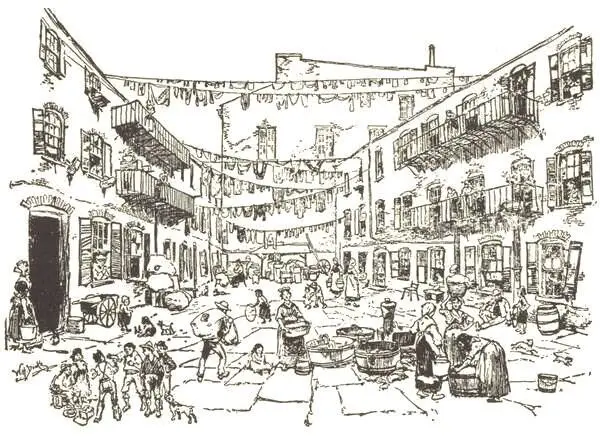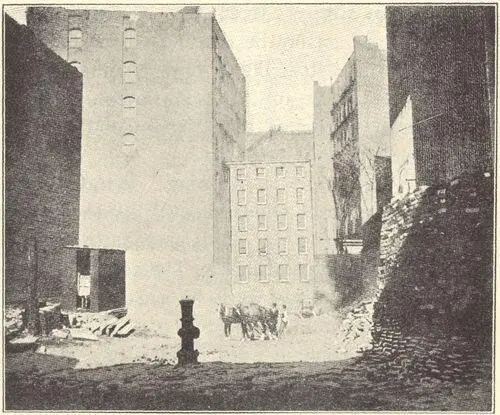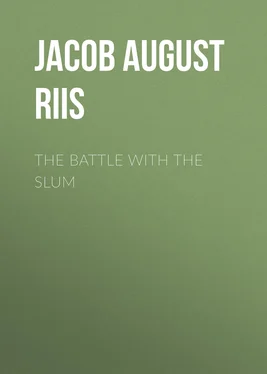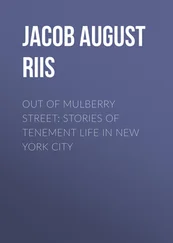Jacob August Riis - The Battle with the Slum
Здесь есть возможность читать онлайн «Jacob August Riis - The Battle with the Slum» — ознакомительный отрывок электронной книги совершенно бесплатно, а после прочтения отрывка купить полную версию. В некоторых случаях можно слушать аудио, скачать через торрент в формате fb2 и присутствует краткое содержание. Жанр: foreign_prose, sociology_book, foreign_antique, на английском языке. Описание произведения, (предисловие) а так же отзывы посетителей доступны на портале библиотеки ЛибКат.
- Название:The Battle with the Slum
- Автор:
- Жанр:
- Год:неизвестен
- ISBN:нет данных
- Рейтинг книги:3 / 5. Голосов: 1
-
Избранное:Добавить в избранное
- Отзывы:
-
Ваша оценка:
- 60
- 1
- 2
- 3
- 4
- 5
The Battle with the Slum: краткое содержание, описание и аннотация
Предлагаем к чтению аннотацию, описание, краткое содержание или предисловие (зависит от того, что написал сам автор книги «The Battle with the Slum»). Если вы не нашли необходимую информацию о книге — напишите в комментариях, мы постараемся отыскать её.
The Battle with the Slum — читать онлайн ознакомительный отрывок
Ниже представлен текст книги, разбитый по страницам. Система сохранения места последней прочитанной страницы, позволяет с удобством читать онлайн бесплатно книгу «The Battle with the Slum», без необходимости каждый раз заново искать на чём Вы остановились. Поставьте закладку, и сможете в любой момент перейти на страницу, на которой закончили чтение.
Интервал:
Закладка:
Slowly, with many setbacks, we battled our way into the light. A Board of Health had come with the cholera panic in 1866. The swine that ran at large in the streets, practically the only scavengers, were banished. The cholera and the yellow fever that had ravaged the city by turns never came back. The smallpox went its way, too, 10 10 They had "health wardens" in the old days, and the Council of Hygiene tells of the efficient way two of them fought the smallpox. One stood at the foot of the stairs and yelled to those minding a patient in the next story to "put pieces of camphor about the clothes of the sick and occasionally throw a piece on the hot stove." The other summoned the occupants of a smallpox smitten tenement to the hall door and cautioned them to say nothing about it to any one, or he would send them all to the pest-house!
and was heard of again only once as an epidemic, till people had forgotten what it was like,—enough to make them listen to the anti-vaccination cranks,—and politics had the health department by the throat again and held the gate open. We acquired tenement house laws, and the process of education that had begun with the foraging ground of the swine was extended step by step to the citizen's home. Short steps and cautious were they. Every obstacle which the landlord's cunning and the perversion of the machinery of the law to serve his interests could devise was thrown in the way. It was a new doctrine to that day that any power should intervene between him and the tenants who represented his income, and it was held to be a hardship if not downright robbery. The builder took the same view. Every tenement house plan was the subject of hot debate between the Health Board and the builder, or his architect. The smallest air-shaft had to be wrung out of him, as it were, by main strength. The church itself was too often on the side of the enemy, where its material interests were involved. Trinity, the wealthiest church corporation in the land, was in constant opposition as a tenement house landlord, and finally, to save a few hundred dollars, came near upsetting the whole structure of tenement law that had been built up in the interest of the toilers and of the city's safety with such infinite pains. The courts were reluctant. Courts in such matters record rather than lead the state of the public mind, and now that the immediate danger of an epidemic was over, the public mind had a hard time grasping the fact that bettering the housing of the poor was simple protection for the community. When suit was brought against a bad landlord, judges demanded that the department must prove not only that a certain state of soil saturation, for instance, was dangerous to health, but that some one had been actually made sick by that specified nuisance. Fat-boilers, slaughter-house men, and keepers of other nuisances made common cause against the new decency, and with these obstacles in front, the Sanitarians found the enemy constantly recruited from the rear. With the immense immigration that poured in after the Civil War, the evil with which they were struggling grew enormously. Economic problems other than the old one of rent came to vex us. The sweater moved into the East Side tenements. Child-labor grew and swelled.
The tenement had grown its logical crop. In the sweating conspiracy it is a prime factor. Its extortionate rates make the need, and the need of the poor was ever the opportunity of their oppressor. What they have to take becomes the standard of all the rest. Sweating is only a modern name for it. The cause is as old as the slum itself.

Jersey Street Rookeries.
However, the new light was not without its allies. Chief among them was the onward march of business that wiped out many a foul spot which had sorely, tried the patience of us all. A carriage factory took the place of the Big Flat when it had become a disgusting scandal. Jersey Street, a short block between Mulberry and Crosby streets, to which no Whitechapel slum could hold a candle, became a factory-street. No one lives there now. The last who did was murdered by the gang that grew as naturally out of its wickedness as a toadstool grows on a rotten log. He kept the saloon on the corner of Crosby Street. Saloon and tenements are gone together. Where they were are rows of factories, empty and silent at night. A man may go safely there now at any hour. I should not have advised strangers to try that when it was at its worst, though Police Headquarters was but a block away.

The Survival of the Unfittest.
I photographed that phase of the battle with the slum just before they shut in the last tenement in the block with a factory building in its rear. It stood for a while after that down in a deep sort of pocket with not enough light struggling down on the brightest of days to make out anything clearly in the rooms,—truly a survival of the unfittest; but the tenants stayed. They had access through a hallway on Crosby Street; they had never been used to a yard; as for the darkness, that they had always been used to. They were "manured to the soil," in the words of Mrs. Partington. But at length business claimed the last foot of the block, and peace came to it and to us.
All the while we were learning. It was emphatically a campaign of education. When the cholera threatened there was the old disposition to lie down under the visitation and pray. The council pointed to the fifteen hundred cases of smallpox ferreted out by its inspectors "in a few days," and sternly reminded the people of Lord Palmerston's advice to those who would stay an epidemic with a national fast, that they had better turn to and clean up. We pray nowadays with broom in hand, and the prayer tells. Do not understand me as discouraging the prayer; far from it. But I would lend an edge to it with the broom that cuts. That kind of foolishness we got rid of; the other kind that thinks the individual's interest superior to the public good—that is the thing we have got to fight till we die. But we made notches in that on which to hang arguments that stick. Human life then counted for less than the landlord's profits; to-day it is weighed in the scale against them. Property still has powerful pull. "Vested rights" rise up and confront you, and no matter how loudly you may protest that no man has the right to kill his neighbor, they are still there. No one will contradict you, but they won't yield—till you make them. In a hundred ways you are made to feel that vested rights are sacred, if human life is not. But the glory is that you can make them yield. You couldn't then.
We haven't reached the millennium yet. But let us be glad. A hundred years ago they hanged a woman on Tyburn Hill for stealing a loaf of bread. To-day we destroy the den that helped make her a thief.
CHAPTER II
THE OUTWORKS OF THE SLUM TAKEN
I said that we got our grip when the civic conscience awoke in 1879. In that year the slum was arraigned in the churches. The sad and shameful story was told of how it grew and was fostered by avarice that saw in the homeless crowds from over the sea only a chance for business, and exploited them to the uttermost; how Christianity, citizenship, human fellowship, shook their skirts clear of the rabble that was only good enough to fill the greedy purse, and how the rabble, left to itself, improved such opportunities as it found after such fashion as it knew; how it ran elections merely to count its thugs in, and fattened at the public crib; and how the whole evil thing had its root in the tenements, where the home had ceased to be sacred,—those dark and deadly dens in which the family ideal was tortured to death, and character was smothered; in which children were "damned rather than born" into the world, thus realizing a slum kind of foreordination to torment, happily brief in many cases. The Tenement House Commission long afterward called the worst of the barracks "infant slaughter houses," and showed, by reference to the mortality lists, that they killed one in every five babies born in them.
Читать дальшеИнтервал:
Закладка:
Похожие книги на «The Battle with the Slum»
Представляем Вашему вниманию похожие книги на «The Battle with the Slum» списком для выбора. Мы отобрали схожую по названию и смыслу литературу в надежде предоставить читателям больше вариантов отыскать новые, интересные, ещё непрочитанные произведения.
Обсуждение, отзывы о книге «The Battle with the Slum» и просто собственные мнения читателей. Оставьте ваши комментарии, напишите, что Вы думаете о произведении, его смысле или главных героях. Укажите что конкретно понравилось, а что нет, и почему Вы так считаете.












